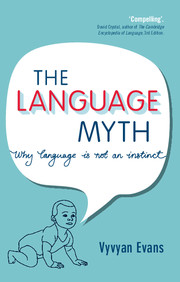Book contents
- Frontmatter
- Dedication
- Epigraph
- Contents
- Acknowledgements
- 1 Language and mind rethought
- 2 Is human language unrelated to animal communication systems?
- 3 Are there language universals?
- 4 Is language innate?
- 5 Is language a distinct module in the mind?
- 6 Is there a universal Mentalese?
- 7 Is thought independent of language?
- 8 Language and mind regained
- Notes
- References
- Index
6 - Is there a universal Mentalese?
Published online by Cambridge University Press: 05 October 2014
- Frontmatter
- Dedication
- Epigraph
- Contents
- Acknowledgements
- 1 Language and mind rethought
- 2 Is human language unrelated to animal communication systems?
- 3 Are there language universals?
- 4 Is language innate?
- 5 Is language a distinct module in the mind?
- 6 Is there a universal Mentalese?
- 7 Is thought independent of language?
- 8 Language and mind regained
- Notes
- References
- Index
Summary
Myth: Meaning in natural languages, like English or Japanese, derives, ultimately, from a universal language of thought: Mentalese. Mentalese is the mind’s internal or private language, and makes thought possible. It is universal in the sense that all humans are born with it. It is language-like, consisting of symbols, which can be combined by rules of mental syntax. Without Mentalese we could not learn the meanings of words in any naturally occurring language – spoken or signed.
The attentive reader will have noticed that, up until this point, we haven’t focused on meaning. The purpose of language, ultimately, is to convey ideas – meanings; hence this is an issue with which we must grapple, and to which we now turn – in this, and the next chapter. In the language-as-instinct thesis, in addition to a Universal Grammar, the human mind also comes pre-equipped with a universal ‘language of thought’: Mentalese. According to Jerry Fodor, who first advocated a language of thought back in the 1970s, it is precisely due to the existence of Mentalese that the meanings of any natural language – spoken or signed – can be learned at all.
Information
- Type
- Chapter
- Information
- The Language MythWhy Language Is Not an Instinct, pp. 161 - 191Publisher: Cambridge University PressPrint publication year: 2014
